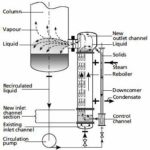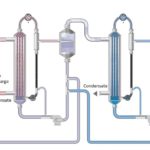I want to draw your attention to our webinar of November 17th: Achieve up to zero-fouling with the self-cleaning heat exchanger technology. I would like to ask you if you could/would like share this in your colleagues if you have an interest in Zero-fouling in heat exchangers. Technology Keep your equipment operational with Klaren International’s … [Read more...]
Eliminating Fouling Reboilers in Continuous and Batch Distillation
Continuous Distillation with a Fouling Reboiler A large chemical plant operates a fouling reboiler with forced circulation on a distillation column. When allowing boiling in the tubes, the operation suffers from severe fouling of the exchanger. Suppressing the evaporation in the tubes by installing a throttle plate in the reboiler outlet did not inhibit fouling. The … [Read more...]
Fluidized Bed Multi-Effect Evaporators in Bio-Ethanol Plants, an Energy Efficient Solution
In bio-ethanol production, a large portion of a plant’s energy demand is consumed at the rotary dryers where moisture content of wet distiller grains with solubles (WDGS) is reduced to values of around 10%. Using fluidized bed Multi-Effect Evaporators (MEE), instead of conventional forced recirculation evaporators, prior to these dryers allows one to significantly … [Read more...]
Produced Water Concentration by Fluidized Bed Evaporators
Produced water is a by-product of oil and gas extraction. Regulations for fresh water recovery from these waters are becoming stricter, which makes operating costs for disposal expensive. Therefore, oil companies are paying more attention to systems to treat this water in an economically efficient way. A combination of forced circulation or falling film evaporation with … [Read more...]
Fluidized Bed Heat Exchanger
A fluidized bed heat exchanger can solve fouling problems in shell and tube heat exchangers. Fouling can really be a burden for plant operators. It reduces heat transfer and can even lead to reduced production capacity. The effect of fouling can be illustrated by an application where quench water had to be cooled: The heat transfer coefficient dropped in a conventional heat … [Read more...]




